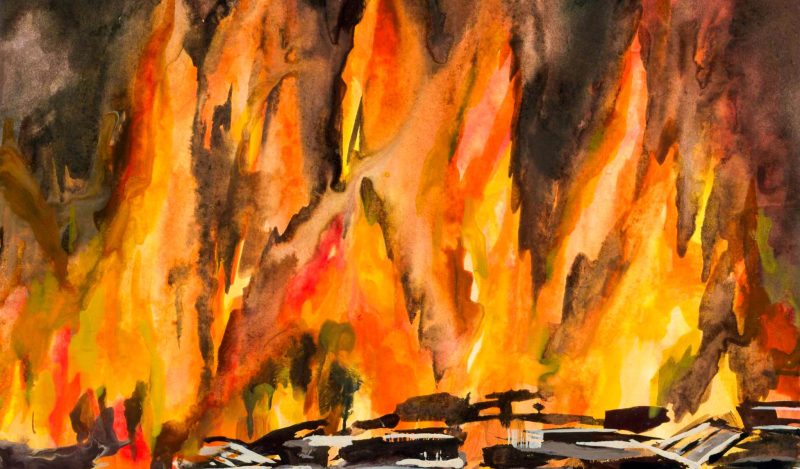As a young lad, I was fascinated by stories of the Great Library of Alexandria and the Mouseion (House of the Muses), its associated center of learning. In 295 BC, the Macedonian general, Ptolemy I Sotor, commissioned Demetrius of Phaleron to embark on what was the most ambitious accumulation of knowledge in the Ancient World.
Stories told of the lengths to which this was carried out. There are semi-apocryphal stories of demanding each ship that docked to present manuscripts to be copied. There was such a rapid accumulation of manuscripts that a “branch” library was founded at a temple devoted to Serapis, which lasted until it was destroyed by the followers of Theophilus in 391 AD.
There is no doubt that hundreds of thousands of manuscripts were at times housed in the library and the research institute. There is also no doubt that the vast majority were lost in wars, social upheaval, and fanatic devotion to ideology. Who knows what secrets were thrown away or discarded? What could be applicable to exploring questions that vex us even today? Could the secret to decoding Linear A have been in the library? Would we learn more about the Sea Peoples and how they figured in the collapse of the Bronze Age Civilizations?
Could it explain the curious connection between Lake Superior copper and the bronze of the Middle East? Why did the works of Homer seem to burst upon the scene in such literary splendor without antecedents? So many questions could have threads of explanation…Imagine how current researchers could have used this massive accumulation of information.
For years, I would shake my head in wonder at how those generations of long ago could have been so blind as to let that all slip through their fingers. Didn’t they realize what they could be throwing away? But then I realized that they were not alone in their foolishness.
So many things have changed in the past five years, and yet, so much is the same as it was 16 centuries ago when ideology allowed the last remnant of the Great Library to be destroyed. There were signs on the horizon decades ago, but they were missed. The Complex Domain exhibits “Retrospective Coherence.” After the fact, the end trajectory of events is more easily seen than while they were happening. Like a Sudoku puzzle, it may be difficult to find the answer, but once found, it can be checked in seconds.
We should have paid more attention to the works of Elinor Ostrom, the first woman to win the Nobel Prize in Economics. For her work on the shared governance of Common Pool Resources, she shared the 2009 prize with Oliver E. Williamson.
Perhaps even more interesting, at least from the point of view of this essay, is her subsequent work with Charlotte Hess in editing Understanding Knowledge As a Commons: From Theory to Practice. The authors of this collection explore the view that knowledge is itself a resource subject to the same constraints as any other resource. There is a tension between ownership and social transparency that we see, increasingly, as a venue of conflict.
In a prescient article accepted in late 2019 but published in January 2020 in The American Journal of Medicine, Baffy and colleagues explored the changing role of medical scholarship. They explained that a small group of publishers, which may have their own business models, control most medical publications. They warned against a possible future where medical knowledge could be controlled by forces other than the altruistic sharing of knowledge. The concluding paragraph should have rung bells:
Longstanding problems in scientific publishing have been brought to the forefront by the digital revolution, which may also help create remedies to many of these challenges. If successes of other industries are any guide, the transition to global online scientific publishing will require constant adaptation by current stakeholders and may reward newcomers with expertise in computer technology and big data management. Scientific publishing has been a highly profitable industry, and there is little doubt that financial interests will continue to drive its transformation. However, the academic community has a fundamental stake in this process and should understand the trajectories of change to protect enduring values, embrace promising developments, and make scholarly communication increasingly inclusive and efficient.
Since the publication of this article, some of their worst fears seem to have materialized. Large-scale censorship of “politically incorrect” views was (and remains) so rampant that it hardly needs a reference. Virtually every person reading this will have personally experienced such censorship of knowledge, either as a healthcare professional or patient.
The systematic censoring of important knowledge has been no less destructive than the burning of the Great Library of Alexandria! Perhaps even more so, as we should have known better.
Even more disconcerting is the fact that Organized Medicine has doubled down on the need to ideologically control medical information. In a recent editorial that appeared in JAMA journals, American Medical Association editors take the illogical position that in order to stop censorship of ideas, they need to impose censorship on anybody who disagrees with them. Is this really any different from a mob burning down a library in 391 AD Alexandria? I think not.
Unfortunately, I have some personal experience with the illogical destruction of resources by individuals who did not understand the magnitude of their actions. In the 2 decades prior to my recruitment as Professor of Ophthalmology, I had accumulated a huge collection of information on clinical problems. Thousands of patient files, including histories, treatment results, X-rays, and clinical photographs, some on exceedingly rare and unusual diseases, were included. One of the stipulations to my contract was the housing of this information to be used as teaching material to impart this knowledge to the next generation. After all, I was recruited as a teacher as well as a clinical surgeon, and this was critical and unique information to fulfill that role.
For a few years, that was smooth. I used this information in my lectures and written papers. Then, the space in which all of this was stored was needed for other things. So, they were transferred offsite. Somewhere along the line, the cost of administering that space became problematic and nobody knows what happened to them. Most likely after all these years they were shredded….
The Knowledge Cycle in medicine is such that at times, seemingly novel problems can only be understood by human memory of prior cases that showed similarity. The ability to go back and review the past data, which had not yet been converted to information, let alone true knowledge is critical. It would have been simple and inexpensive to digitize this data before it was destroyed, recognizing the potential goldmine that could be thrown away. But that was not done.
It would have been one thing if my experience was unique, but a colleague at a nationally known institution (you would recognize it if I told you) had the exact same experience. Decades of data were just thrown away by an administrator who did not have the capacity to know the magnitude of their actions yet had the power to do it. If you were to ask them if they would give their grandfather’s early 20th century coin collection to their child to spend on candy in vending machines, they would have thought you were joking. Yet they had no compunction about doing the same thing with intellectual capital!
Although I can’t find independent corroboration, the Stradivarius expert Kevin Lee reports (time 14:40 of video) that an errant museum employee sent pieces of original Stradivari violins to a landfill. While I am sure nothing in my files would equal this monumental mistake, all of this points out the fragile nature of important information. All too often it is in the hands of people who have no appreciation for the potential importance of what they control. How is this possible? What should be done to prevent tragic disasters that inevitably will occur?
Join the conversation:


Published under a Creative Commons Attribution 4.0 International License
For reprints, please set the canonical link back to the original Brownstone Institute Article and Author.









